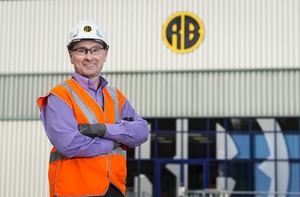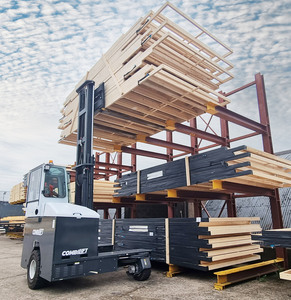

|
Edward Lowton
Editor |


|
| Home> | Handling and Storing | >Lift trucks & ancillaries | >Plugging in to greener power |
Plugging in to greener power
02 September 2022
Switching to electric power can benefit not just the environment but also your workforce, your neighbours and your balance sheet, says Ricky Durkin

WHEN COMBILIFT was established in 1998, the world was quite a different place. In that year, Google was incorporated as a private company in California and only 9% of households had access to the internet. And in the world of industrial vehicles, diesel power was the default choice for the majority, as it was considered to offer the best performance in demanding working conditions.
Times have of course changed, and the growing demand for electric powered vehicles and equipment has been fuelled by shifting public attitudes towards pollution and more stringent legislation. This has put pressure on companies in a wide variety of industry sectors to 'clean up their act' and to focus on more sustainability. The latter is all about taking a long-term look at how you operate, and this will often involve investment in new technology.
Switching to an electric fleet from diesel is now a much more attractive option than it once was, and this is down to improved battery performance and technology, which enables ever increasing lift capacities, longer run times and much longer intervals between charging. The latest generation of electric trucks are also versatile and can work indoors and out, which can reduce the overall number of forklifts required and consequently the carbon footprint – as well as operational costs and outlay for insurance, maintenance and so on. So what is good for the planet can also be good for your business.
Saving fuel costs
Talking of finances: the initial cost of an electric truck may be higher than a diesel model, but over a truck’s lifetime the TCO can work out to be better. The rocketing price of fuel makes it more expensive than charging batteries, and this has been more of an issue since 1 April this year as it is no longer be legal to use red diesel for non-road mobile machinery. As electric powered trucks do not have traditional combustion engines or hydraulic transmissions, there is no longer any need to check and top up engine fluids or lubricants. This results in longer intervals between services, for further cost saving.
But it’s not all about money either. Just as on-street emissions from traffic has proved to be the cause of serious health problems, people need to be protected from pollution at their place of work. The British Safety Council has called for limits on the amount of exposure to diesel emissions, and an electric fleet obviously improves air quality on site and reduces the potential risks to employees. There is increasingly more focus on comfort and wellbeing when it comes to noise pollution. The workforce, visitors, neighbours and local wildlife will appreciate the peaceful and quiet operation of electric powered equipment.
Combilift produced its first electric multidirectional C-Series model over 18 years ago, and is supporting its customers in their aims for more sustainable operation by expanding its range of electric powered products. In the last year alone it has added four new electric models to its portfolio, and more than 60% of the trucks that come off the production lines in Monaghan are now electric. New models include the Combi-XLE multidirectional forklift with a 5t lift capacity, the Combi-FSE, a 4-wheel two directional sideloader with 5t and 6t lift capacity and the Combi-MR4, a multidirectional reach-truck, which incorporates Combilift’s new Dynamic 360° steering.
Roger Bullivant switches on to electric handling
If you have driven past a major construction site recently, the chances are that the foundations will have been supplied by Roger Bullivant, the UK’s leading ground engineering company. With over 40 years’ experience in its field, RB designs and manufactures precast concrete elements such as pilings for installation in its engineered foundation systems for diverse types of buildings and structures.
The manufacturing HQ, which covers over 22 acres of land, is located in Swadlincote in the heart of the National Forest, and as part of the company's 'grey to green' initiative, for every metre of precast concrete pile manufactured there, a donation is made to support the continued creation and management of woodlands.
Sustainability is therefore a key priority, and as part of the group’s strategy to reduce its carbon footprint by 40% by 2030 it has replaced the factory’s entire fleet of diesel powered materials handling equipment with new electric forklift trucks. This investment has significantly eliminated harmful exhaust co2 emissions and exhaust particulates inside the factory, enhanced the company’s carbon footprint and reduced overall fuel costs.
RB was one of the first companies to take delivery of Combilift’s new electric Combi-XLE models in mid-2021, which incorporate the same key design features of their earlier IC-powered counterparts. These include high ground clearance, large cushioned front and rear tyres and a spacious cab, allowing smooth operation on semi rough terrain whilst offering a high level of driver comfort and visibility. The trucks were chosen for their ability to efficiently cope with the vast yearly output of around one million metres of precast concrete piles and 180,000 linear metres of precast foundation beams, whilst now offering the added benefits of quiet and emission free operation.
Avoiding tight spots
The five 5t capacity trucks work inside the factory, taking products from the manufacturing area to outside storage bays where packs of pilings, which can be up to 6m in length, are stacked to a height of around 2m and left to cure for 14 days before being ready for nationwide customer delivery. The Combilifts’ multidirectional manoeuvrability enables easy access to tight spots between the stacks or around corners with even the longest loads.
"It’s a very extensive and busy site here with a fast turnaround, and the trucks are constantly on the go," says yard supervisor Neil Parry. "As well as moving the volumes of products from the factory, they load around 35 HGVs a day, which at 27t per load equates to them lifting a daily total of almost 1,000t, so powerful performance and speedy, reliable operation in this intense and demanding environment is a must."
Given that Roger Bullivant has been working with Combilift unit for a number of years, production director Dave Clement notes "the production decision was straightforward", particuarly given their "versatile and space saving characteristics".
"From a driver perspective, the operation remains essentially unchanged. Battery life generally lasts a whole shift, but we have a number of charged spares that can be quickly changed-out on particularly busy days. To round off this green initiative we have also installed solar panels on the factory which provide the recharge energy," he adds.
Ricky Durkin is UK manager at Combilift
For more information:
Tel: +353 47 80500



















